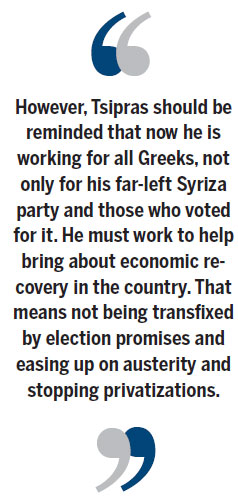PM's choice: new ideas or political death
Updated: 2015-02-06 07:39
By Fu Jing(China Daily Europe)
|
|||||||||||
Greek government cannot afford to tear up the country's recovery plans
In the two weeks or so since winning office, new Greek Prime Minister Alexis Tsipras has wasted no time in beginning to honor the promises he made in the country's election campaign.
At root this has amounted to repudiating the previous government's agenda.
For example, the new government says it will not cooperate with the European Commission, the European Central Bank and the International Monetary Fund on their tems for repaying debt, now 175 percent of GDP. It has decided to abandon austerity measures and says it will raise the minimum wage from about 600 euros a month to 750 euros a month, which is what it was before the financial crisis.

It has also halted plans to sell off government assets and sacked the heads of the state privatization agency. Those plans had helped the country win support from the EU, the European Central Bank and the IMF for a 240 billion euro ($272 billion) bailout.
Chinese media have reacted sharply to this course of events, some saying that the policy U-turn is likely to cost China Ocean Shipping (Group) Company dearly. That is because it runs two container terminals in Greece under a 35-year concession signed in 2008. COSCO also was shortlisted in the planned privatization of 67 percent of the Piraeus Port Authority.
However, the Greek government has pledged to protect COSCO's rights in running the two terminals.
In the meantime, Tsipras and his team have begun a charm offensive with European partners to obtain new terms to extend debt repayments. Some say the door for talks is open and others insist Greece must stick to austerity policies to keep debt down, thus bringing economic recovery.
This month, Tsipras and his team will also hold talks with Britain, Italy and France, and this engagement will continue until he attends his first meeting with European leaders in Brussels at a summit on Feb 12.
Although the market has reacted nervously to Tsipras' ascension to power, he has been level-headed in dealing with the debt issue, promising to pay debts eventually and not to act unilaterally. Given the cooperative attitude he has displayed in his first days in office, he should be encouraged.
It is hoped that as the EU and Greece act this way, anger, distrust and disorder - like that which happened between 2010 and 2012, the most difficult years of the European debt crisis - will be avoided.
However, Tsipras should be reminded that now he is working for all Greeks, not only for his far-left Syriza party and those who voted for it. He must work to help bring about economic recovery in the country. That means not being transfixed by election promises and easing up on austerity and stopping privatizations. He has to keep pulling two levers, one that reduces the mountain of debt and the other that stimulates economic growth.

In the early days of his incumbency it remains to be seen how he will pull Greeks out of economic recession.
The official party line is oriented against the market, privatization and reform, and that is clearly out of sync with the zeitgeist. If that path is followed, Greece will be isolated, economic failure will follow, and Tsipras will quickly fall out of favor with voters.
Working for all Greeks within the EU framework, Tsipras would do well to moderate the party line, remembering one golden rule of politics: Those who cannot control their country's finances are doomed to electoral oblivion.
When he and his team meet their European partners, they must have a plan to present, even if the details on how they are going to proceed with it remain sketchy. The bottom line for the Greek government is to present fresh ideas.
The government should at least put fresh ideas on the table, ones that explain how the country's domestic agenda is to dovetail with those of its counterparts in the EU and European Central Bank.
Brussels has been putting the final touches on a three-year investment plan amounting to 315 billion euros, and the European Central Bank has announced it will buy 60 billion euro government bonds from member states every month until September next year. Right now it is difficult to see how the steps Tsipras has taken in the past couple of weeks can help his country benefit from these measures.
For him the choice is to change or to put his country at risk of further economic damage, and bring on himself and his party the political damage that will undoubtedly inflict.
The author is China Daily chief correspondent in Brussels. Contact the writer at fujing@chinadaily.com.cn
(China Daily European Weekly 02/06/2015 page11)
Today's Top News
Chinese FM eyes 'harvest' for ties with Slovakia
Russia leads UN initiative to target IS
New Greek govt lobbies across Europe for solution to its debt
Birmingham plans to transform city into global financial hub
China: Norway violates rights of Chinese scholar
Italy extradites suspect in theft
A great future for UK-China business relationship
Former IMF chief Strauss-Kahn on trial over pimping charges
Hot Topics
Lunar probe , China growth forecasts, Emission rules get tougher, China seen through 'colored lens', International board,
Editor's Picks

|

|

|

|

|

|





